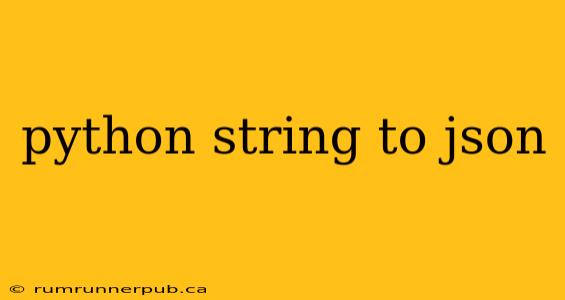Converting a JSON string to a Python dictionary (and vice-versa) is a fundamental task in many Python projects. This article delves into the process, drawing upon insights from Stack Overflow and adding practical examples and explanations to solidify your understanding.
Understanding the Problem
Often, you receive JSON data as a string – perhaps from an API call, a configuration file, or a database. This string needs to be parsed into a usable Python dictionary or list of dictionaries to be effectively manipulated. Conversely, you might need to convert a Python dictionary into a JSON string for storage or transmission.
The json Module: Your Best Friend
Python's built-in json module provides the tools for seamless JSON handling. Let's explore the core functions:
1. Converting a JSON String to a Python Dictionary
The json.loads() function is your go-to for this task. Let's examine a classic Stack Overflow scenario (though adapted for clarity):
Example (inspired by numerous Stack Overflow posts about json.loads() errors):
Suppose you have a JSON string like this:
json_string = '{"name": "John Doe", "age": 30, "city": "New York"}'
Using json.loads():
import json
data = json.loads(json_string)
print(data) # Output: {'name': 'John Doe', 'age': 30, 'city': 'New York'}
print(data["name"]) # Accessing individual elements: Output: John Doe
Error Handling (Crucial!): Real-world JSON strings might be malformed. Always wrap your json.loads() call in a try...except block to handle potential json.JSONDecodeError exceptions:
import json
try:
data = json.loads(json_string)
# Process the data
except json.JSONDecodeError as e:
print(f"Error decoding JSON: {e}")
This robust approach prevents your program from crashing due to invalid JSON. This is a point frequently highlighted in Stack Overflow discussions about JSON parsing.
2. Converting a Python Dictionary to a JSON String
The counterpart to json.loads() is json.dumps(). This function serializes a Python dictionary into a JSON string.
Example:
import json
python_dict = {"name": "Jane Smith", "age": 25, "city": "London"}
json_string = json.dumps(python_dict, indent=4) # indent for pretty printing
print(json_string)
# Output (with indent):
# {
# "name": "Jane Smith",
# "age": 25,
# "city": "London"
# }
The indent parameter (optional) formats the JSON string for better readability.
Advanced Scenarios & Stack Overflow Wisdom
Stack Overflow frequently addresses more complex situations:
-
Handling Non-UTF-8 Encoding: If your JSON string isn't encoded in UTF-8, you might need to specify the encoding when opening the file (if it's from a file) or using
decode()before usingjson.loads(). Many Stack Overflow answers address encoding issues. -
Dealing with Large JSON Files: For extremely large files, consider using iterative parsing techniques to avoid loading the entire file into memory at once. Efficient parsing of large JSON files is a recurring theme on Stack Overflow.
-
Custom JSON Encoders/Decoders: For complex data types (e.g., custom classes), you may need to create custom JSON encoders/decoders using
json.JSONEncoderandjson.JSONDecoder. This allows you to serialize and deserialize objects that aren't natively handled by thejsonmodule.
Conclusion
Successfully converting between JSON strings and Python dictionaries is crucial for interacting with APIs, databases, and configuration files. By mastering the json module and understanding common pitfalls highlighted on Stack Overflow, you can build robust and efficient Python applications. Remember to always practice error handling for a more reliable program.
